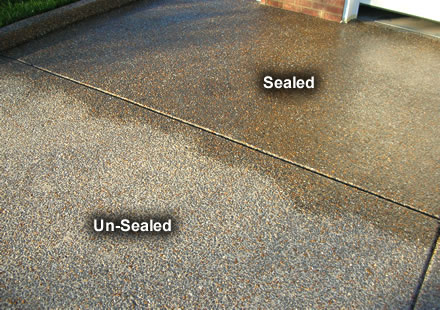Think of your concrete driveway as the welcome mat to your home. It gets a lot of foot traffic and action from cars and sees all kinds of weather, which can make it look dirty and worn.
But don’t worry— we’ll share practical steps on how to clean a concrete driveway and make it look new again. We’ll also explore the benefits of sealing concrete and seeking the help of a professional.
Key Takeaways
- Identify your concrete type and choose appropriate cleaning methods to avoid damage.
- Sweep regularly, deal with spills as soon as they happen, and use a strong water spray for deep cleaning.
- Tough driveway stains might need special treatment, like bleach for oil stains or a special concrete cleaner for tire marks.
- For an efficient clean and a protective seal, call in the pros for a little extra help.
- Keep your driveway looking good by sweeping, checking your car for leaks, and giving it a good wash a couple of times a year.
Choosing the Right Cleaning Method and Cleaners for Your Type of Concrete
Driveways can be made of different kinds of concrete, and each kind needs its own way of cleaning to look its best.
Your driveway is probably made of standard concrete, which is the type most often used outdoors. This is different from decorative concrete, which you usually find inside.
Using the wrong cleaners can accidentally ruin your driveway or leave behind tough stains on the concrete surface, so it’s important to know what kind of concrete you have.
If you’re not sure about the best way to clean your concrete driveway, it’s smart to ask someone who knows a lot about concrete. They can tell you the best way to take care of it so you can make your driveway clean and shiny without any damage.
How to Clean a Concrete Driveway Using Pressure Washing & Other Cleaning Methods
When it comes to cleaning your concrete driveway, the right method for you depends on the severity and type of stain, as well as your personal preference. Let’s go over a few:
- Regular Sweeping: This should be your first line of defense. It keeps dirt and debris from building up and making a bigger mess later.
- Spot Cleaning: If you notice a stain, tackle it immediately with a broom, garden hose or a power washer, and dry granular degreaser.
- Pressure Washing: For tough stains, use a pressure washer, but be sure to follow all safety instructions.
- Professional Concrete Cleaning: When DIY methods aren’t enough, consider hiring a professional cleaning service.
- Sealing: This preventive measure can help avoid future stains and make cleaning easier.
Steps for Successful Spot Cleaning to Remove Oil and Grease Stains
You can do spot cleaning to tackle those stubborn stains on your concrete driveway. Here’s how:
Step 1: Choose a sunny day to make the cleaning process easier and faster.
Step 2: Begin by sweeping away loose debris, then target the stain directly with a granular cleaner and a stiff bristle scrub brush. Scrub vigorously until you see an improvement.
Step 3: Rinse the area thoroughly with a hose, ensuring all cleaning residues are washed away.
Step 4: If the stain is still visible, repeat the process. You might have to do this a few times for stubborn stains.
Remember, patience is key, and with a little elbow grease, you’ll restore your driveway’s pristine look. Make sure you’re using cleaners compatible with your concrete to avoid further staining or damage.
Pressure Washer Techniques and Tips For Effective Concrete Cleaning
For a more thorough clean, you might want to pressure wash the concrete driveway. This method not only provides a deep clean but also gets rid of tough stains and grime that other cleaning methods can’t handle.
Here are a few pressure-cleaning techniques and tips:
- Opt for a medium-duty pressure washer, ideal for concrete driveways.
- Use a detergent specifically made for concrete and safe for pressure washers.
- Keep the nozzle moving to avoid etching a line into the concrete.
- Wear protective gear and be aware of your surroundings to prevent any accidents.
- Once done, rinse the driveway with plain water to wash away any residual detergent.
With these tips, you’ll have your driveway looking brand new in no time.
Concrete Driveway Cleaning: How to Remove Grease, Tire Marks, and Oil Stains From Concrete
Even with regular pressure or power washing, you’ll likely encounter stubborn stains on the surface of your concrete driveway that require more specific treatment.
Oil spills and stains, for example, can be a real nuisance. Try thoroughly treating these with bleach and water, and scrubbing the area. Remember to wear protective gear when handling bleach.
For grease stains, consider using kitty litter to absorb the grease before sweeping it away. If you don’t have a pet, dry cement powder can step in as a handy alternative.
Apply it just like you would the kitty litter, but remember, once it’s done the job, you should toss the used cement in the trash. Washing cement down the drain is a no-go as it can cause major plumbing disasters.
Tire marks can be a challenge, too, but an orange citrus concentrate cleaner usually does the trick. If you don’t get all the tougher stains on the first go, just repeat the process until the stain is completely gone.
Handling Hazardous Deep Cleaning Products & Materials
When dealing with hazardous cleaning materials for your concrete driveway, you should prioritize safety above all else. Mishandling these substances can lead to personal injury or environmental damage.
To ensure that you handle these materials safely:
- Always read and follow the instructions on the product label.
- Wear proper protective gear, such as goggles and gloves, when scrubbing with bleach or any strong detergent.
- Use these materials in a well-ventilated area to avoid inhaling fumes.
- Avoid mixing bleach with other household cleaners, as it can produce harmful reactions.
- Dispose of leftovers properly; don’t just pour them down the drain.
Save Time and Money with Professional Concrete Driveway Cleaning
Even though you can clean your driveway by yourself, hiring a professional cleaner has some big perks.
Professionals possess comprehensive knowledge and expertise in handling different types of concrete and stains. They use top-quality equipment and appropriate cleaning solutions, ensuring an efficient and thorough clean without causing damage to your driveway.
More than that, they can perform tasks such as sealing to protect your driveway from future stains and wear and tear.
Also, consider the time you’ll save letting the pros handle the job.
And while you might think it’s costly, considering the potential for expensive repairs from DIY mishaps. Professional cleaning can be a cost-effective choice.
Benefits of Concrete Sealing For Maintaining a Clean Concrete Floor and Surfaces

Sealing your concrete driveway can provide a host of benefits that will protect and improve your home’s exterior. It’s a protective measure that will help resist wear and tear from weather, traffic, and spills.
Concrete sealing also makes regular cleaning easier by preventing dirt, oil, and other substances from penetrating the surface. It’s effective in preventing water damage and unsightly staining, preserving your driveway’s aesthetic appeal.
Sealing concrete extends its lifespan, saving you money in the long run. Plus, it provides a sleek, polished appearance that boosts your property’s curb appeal.
Simple Steps to a Low-Maintenance Concrete Driveway All Year Long
Maintaining a driveway shouldn’t be a monumental task, but it’s easy to overlook until unsightly stains and mysterious piles make an appearance. To maintain a clean driveway with minimal effort throughout the year, consider these straightforward strategies:
- Apply sealer to your driveway on a routine basis. Resealing can shield the concrete from the elements and prevent unsightly cracks.
- Regularly sweep off leaves, dirt, and other debris. A quick pass with a broom, leaf blower, or hose can prevent buildup and stains.
- Keep your vehicles well-maintained to avoid oil or grease stains on the concrete. An occasional check under your car for drips can save you from stubborn stains later on.
- Make sure your home’s drainage system is diverting water away from your driveway to prevent water damage and pooling.
- Encourage visitors and service providers to park on the street rather than on your driveway. This minimizes the weight load and potential damage to the surface.
- Approach your driveway with care. Avoid aggressive driving like sharp turns or sudden braking to prevent skid marks and tire scuffs.
- Plan for a thorough cleaning twice a year, ideally during spring and fall. A good wash can remove stains and accumulated grime and keep your driveway looking like new.
These measures will not only maintain the integrity of your driveway but will also ensure it stays looking clean and welcoming all year round.
Conclusion
Whether tackling tough stains or considering professional cleaning services, understanding your concrete and the right cleaning methods is essential.
With our guide, you’re now equipped to refresh your driveway’s look and extend its lifespan with concrete sealing.
Remember, investing time or money into maintaining your driveway is a valuable step towards preserving your property’s curb appeal.
So, roll up your sleeves or reach out to a professional. The team at Stone Protection can have your concrete driveway ready for its revival.
FAQs
What is the best thing to clean a concrete driveway with?
To clean a concrete driveway effectively, combining clean water with a concrete degreaser or a mixture of distilled white vinegar and baking soda often yields the best results. Gently scrub and let it sit before rinsing off.
What do professionals use to clean concrete?
Professionals typically use a concrete degreaser, commercial-grade cleaners specialized for concrete, and tools like a hose or pressure washer to thoroughly clean concrete surfaces.
How do you clean dirty outdoor concrete?
Cleaning dirty outdoor concrete, such as a concrete patio, requires sweeping away debris, applying a cleaning solution like diluted vinegar or baking soda paste, and scrubbing. For tough mildew or rust stains, letting the solution sit before rinsing can improve cleaning efficacy.
Is it OK to pressure wash concrete?
Yes, it is OK to pressure wash concrete, as it’s an effective method to remove built-up grime. However, using the correct pressure settings is crucial to avoid damaging the surface.
How do you make concrete look new again?
To make concrete look new again, apply a diluted mixture of water and concrete cleaner or create a paste with baking soda for a gentle clean. Scrub with a brush, then rinse thoroughly. Sealing the concrete afterward can restore its luster.
How do you clean a concrete driveway without pressure washing it?
To clean a concrete driveway without pressure washing, opt for options like scrubbing with a solution of dish soap and water or using a mixture of baking soda and distilled white vinegar. Let the solution sit to break down dirt and stains, then rinse with a garden hose for the best results.





